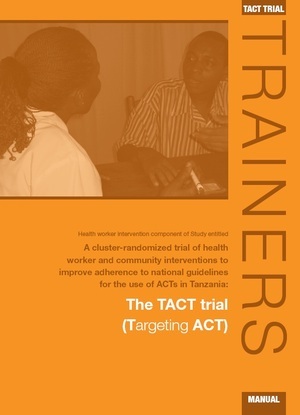Malaria diagnosis training manuals released
6 February 2014

Health workers may now benefit from training manuals to best use malaria rapid diagnostic tests (RDTs). The resource was developed during a clinical trial in Tanzania and the authors encourage other health settings to adapt them.
The Joint Malaria Programme in Tanzania and the ACT Consortium developed trainer and trainee manuals to assist health workers to implement the policy set by the World Health Organization to better manage cases of fever.
The training recognises the challenges that health workers must overcome when incorporating malaria rapid diagnostic tests (RDTs) into their long established practices. Previously, they would treat patients based on their signs and symptoms (known as presumptive treatment) rather than on a blood test.
In small, interactive groups within the workplace, the training helps health workers develop the capacity to find feasible ways to adhere to RDTs in order to change their behaviour for the long term.
Targeting ACTs: the TACT trial
The manuals were used during the TACT trial of the ACT Consortium. TACT stands for “Targeting ACTs”, or artemisinin-based combination treatments, recommended by the WHO to treat cases of P. falciparum malaria.
The trial aims to find the best ways to use malaria rapid diagnostic tests, so that patients with malaria do get treated, and patients without malaria do not receive an ACT drug but get treated for their likely illness.
“These manuals were important for the success of the intervention and will be useful for adaptation in Africa,” said Dr Hugh Reyburn, principal investigator of the TACT study and senior lecturer in clinical epidemiology at the London School of Hygiene & Tropical Medicine. “They were tested during a trial and therefore have validity,” he added.
Preliminary results from the TACT trial suggest that training and motivational text messages can help reduce the overprescription of malaria drugs. Giving leaflets to patients also seemed to improve the way health staff used rapid diagnostic tests.
Those interested in adapting the training manuals should email hugh.reyburn@lshtm.ac.uk.
Further information
- Read the usage policy and copyright for the TACT training manuals
- Download the TACT Trainee and Trainer manuals
- Learn more about the TACT trial
- Read peer reviewed publications from the TACT project
- Expore our venn generator tool to illustrate the extent to each malaria treatment is targeted to malaria patients

